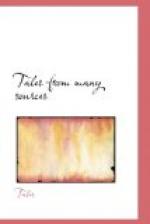It seemed but a moment since Josiah had heard the captain call out “Let go all,” and there they were in space a thousand feet above the level of the land, sailing calmly along in bright warm sunlight, and with no more motion perceptible than if they were still sitting in the room in King Street—that cherished apartment which Josiah felt his eye would never light on more.
“This won’t do,” said the captain sternly; “we’ve got in the wrong current, and instead of going out to sea we are going inland. In half an hour we’ll be at Canterbury.”
“I have heard Canterbury’s a very nice old town,” said Josiah. “It wouldn’t be a bad place to stop at; and if the wind’s contrary to-day, it might be right to-morrow.”
The captain said nothing, and Josiah, looking up to see what effect his suggestion might have, noticed for the first time that on a face usually smiling there were possibilities of a fixed hard look which it evidently didn’t beseem him to trifle with.
The balloon slowly rose till the aneroid marked a height of 1,500 feet and still the current drove it steadily north-west. Looking southward, Josiah beheld a sight which, if it were the last he was ever to look upon, was at least a glorious glimpse of earth, and sky, and sea. There lay the Channel gleaming in the sun, a broad belt of silver. Beyond it, like a cloud, was France. Dover had vanished even to the crest of the castle on the hill. But Josiah knew where it was by the mist that lay over it and shone white in the rays of the sun. Save for this patch of mist, which seemed to drift with the voyagers far below the car, there was nothing to obscure the range of vision. Josiah could not at any time make out forms of people. The white highways that ran like threads among the fields, and the tiny openings in the towns and villages which he guessed were streets, seemed to belong to a dead world, for nowhere was there trace of living person. The strange stillness that brooded over the earth was made more uncanny by cries that occasionally seemed to float in the air around them, behind, before, to the right or to the left, but never exactly beneath the car. They could hear people calling, and the captain said that they were running after the balloon and cheering. But Josiah could distinguish no moving thing. Yes; once he saw some pheasants running across a field below and pointed them out to the captain. The captain laughed, a strange resonant laugh it seemed in this upper stillness, and said they were “a lot of chestnut horses capering about in the field.” A flock of sheep in another field huddled together, looked like a heap of limestone chippings. As for the fields, stretched out in illimitable extent, far as the eye could reach, they seemed to form a gigantic carpet, with patterns chiefly diamond-shaped, and in colour shaded from bright emerald to russet brown.
“This won’t do,” the captain said again, and seizing a bag of ballast he emptied it. The balloon swiftly rose, and the aneroid marked 2,500 feet. The villages seemed mere spots, the pattern of the carpet grew blurred. Nothing was distinguishable—nor horse, nor sheep, nor any living thing.




